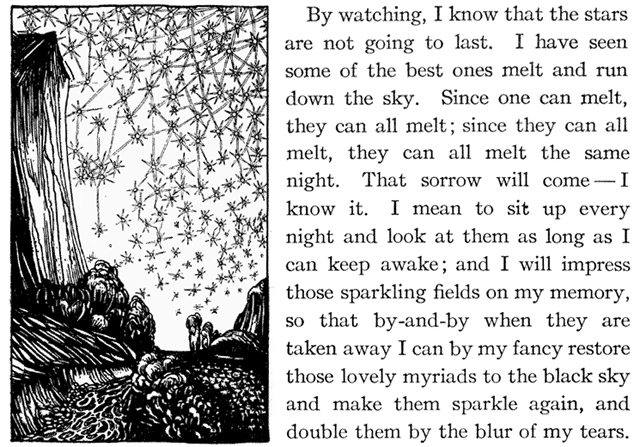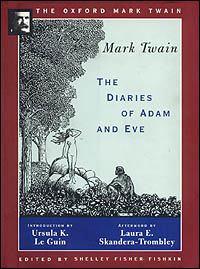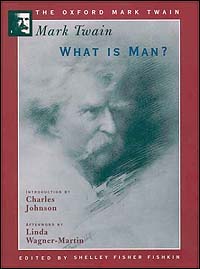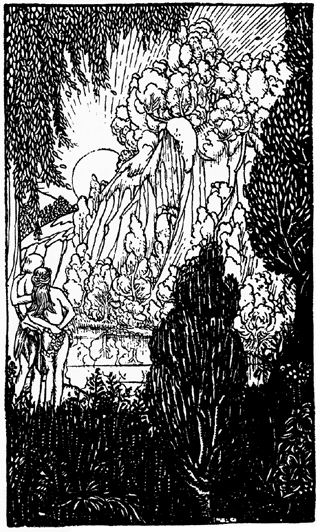
The Diaries of Adam and Eve collects two short stories that Twain based very very loosely on the Book of Genesis. It wouldn't be entirely inaccurate to call this a picture book, as illustrations make up exactly half of each story: full-page pictures on the even-numbered pages, text on the odd-numbered ones. In "Extracts from Adam's Diary," these illustrations are rendered as crude carvings in stone slabs, which fits the tone of the piece; as one commentator points out, it resembles nothing so much as "The Flintstones." It's got the same reliance on anachronism (eg, picture of a Stone Age guy sitting in a recliner smoking a cigar and reading a newspaper) and, like the 60s cartoon, features a loutish protagonist. Twain's Adam just wants to relax, and is irked at the arrival of this nattering presence in the background that calls herself Eve. In a cruel moment, he kicks her out into a rainstorm so he can have his shelter to himself "in peace," noting distantly that "it shed water out of the holes it looks with" after he has done so. The rest of the story continues in this vein: Eve is over-eager about something; Adam scoffs, sometimes rightly and sometimes wrongly; comedy supposedly ensues. There are some funny bits but all in all it's not one of Twain's best efforts. The ending also echoes A Connecticut Yankee in jumping years into the future and revealing that the protagonist, who had previously disdained the silly female who followed him around, now cherishes her as the author of the domestic bliss that has given his life meaning and whatnot. Yankee was first published in 1889, "Adam's Diary" in 1893, when Twain's family was intact. "Eve's Diary" was written in 1905, after the death of Twain's wife of thirty-four years, Livy. Livy Langdon was of a higher social class than Twain, more educated and more politically progressive. To a great extent "Eve's Diary" is a eulogy for her — most clearly so on the last page, as Adam mourns her at her grave, but really all the way through. This is really quite a remarkable piece of work.
She wonders about every aspect of the world, but above all else she wonders about her relationship with Adam, and why they treat each other the way they do. In the third-to-last section of the story, "After the Fall," Eve delivers a soliloquy, not entirely unlike Carver Fringie's, about why it is that she loves Adam: not for his beauty, for that is questionable, nor for his mind, for he's none too bright, nor for his grace or his industry, for he lacks both. Chillingly, she continues, "At bottom he is good, and I love him for that, but I could love him without it. If he should beat me and abuse me, I should go on loving him. I know it." So what's the answer? "I think I love him merely because he is mine and he is masculine." It's not rational, not a matter of choice — it's just her nature, and she has to follow her inborn programming. This is what What Is Man? is about, as it happens — it's a Socratic dialogue, just straight philosophy, that Twain fiddled with for thirty years before finally releasing it anonymously in an edition of 250 copies. In this very slim volume, Twain sets forth the reasons he thinks humans are nothing more than machines; and by machines he means something very much like what I said in my review of Thirteen, that people are loci of history and biology and statistics playing themselves out. He also harps on the idea (brought up by the judge in Red) that people never do anything unless it is primarily to assuage their consciences — all charity is motivated by self-interest, in other words, though the upshot of this is obscure since he makes it into a tautology. Anyway, it's interesting for philosophy, I guess, but when you have a gift for illustrating your ideas as Twain did, it seems a waste to deliver them in this manner. Back to Eve. Just as Adam's mournful words at Eve's grave seem to be transparently those of Twain for his wife, it is easy to read the "After the Fall" section of "Eve's Diary" as his (bleak) thoughts about why someone like Livy would have put up with someone like him for over a third of a century. But that's hardly unique. Do we ever feel worthy of the people we love? Does it ever stop being astonishing to be loved in return? I think this is a pretty universal chord to strike, even for those who at least on the surface have a healthy ego. But it's not just the ideas and the current of feeling running through it that make "Eve's Diary" one of Twain's greatest achievements. It's also the lyricism of it. Lyricism is not a quality traditionally associated with Twain, though he had his moments here and there. As "Eve's Diary" progresses, though, the paragraphs become as poetry. The last paragraph of the prelapsarian section of the story is among the most beautiful things I've ever read. I think I'll finish this off by simply reproducing it here:

|



